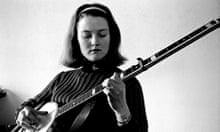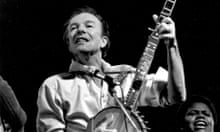The singer, banjo player and songwriter Pete Seeger, who has died aged 94, popularised folksong performance during the 1940s and 50s and was a key figure in the folk revival from the 60s onwards. He wrote Where Have All the Flowers Gone? and helped make famous We Shall Overcome. A multitude of artists recorded his work across six decades, including Odetta, Bruce Springsteen and Peter, Paul and Mary, and he recorded more than 100 albums himself. But above all, Seeger, blacklisted in the mid-1950s at the height of McCarthyism, was a deeply radical American.
Seeger made his first recordings in New York in 1940 with the Almanac Singers musical collective. The album Talking Union (1941-42) was adopted by American labour activists for generations, and the group, which was soon joined by the folk singer Woody Guthrie, also recorded anti-war ballads, which proved embarrassing when Nazi Germany invaded the Soviet Union, the Japanese bombed Pearl Harbor, and the American left became ferociously patriotic.
However, the Almanacs regained some respectability with their musical tributes to the war effort. The Sinking of the Reuben James, written by Guthrie, became an anthem of battle courage, the Office of War Information hired them to sing for overseas broadcasts to US troops – and the FBI watched them closely. The group dissolved as various members were called to second world war duty. Seeger was drafted into the army and went to the Pacific in 1942. The following year he married Toshi Ohta.
In December 1945, a group of musicians, choral directors and union educators met at Seeger's New York apartment to form People's Songs. A quasi-political movement with far-flung chapters and a booking agency, People's Songs furiously promoted the "hootenanny" – informal sessions where musicians and fans traded songs and shared leftwing political enthusiasms. At first welcomed by the press and labour organisations, People's Songs fell victim to the cold‑war atmosphere. It was left badly exposed politically by its participants' intense involvement in the radical 1948 Progressive party presidential campaign of Franklin D Roosevelt's former vice‑president Henry Wallace.
The successor to People's Songs was Sing Out!, a mini-movement and magazine of topical songs. It was never as successful, but it kept the radical flame alive through the 1950s McCarthy witchhunts. Indeed, Sing Out! survives to this day.
In 1948, together with Lee Hays and other veterans of the Almanacs, Seeger formed the Weavers. A brief triumph followed. In 1950 they had a multimillion sales chart success with Goodnight, Irene – first popularised by Lead Belly (Huddie Ledbetter) – and a string of other hits followed including So Long, The Roving Kind, On Top of Old Smokey and Kisses Sweeter Than Wine. They were one of the most successful musical acts in America.
Then came the blacklist. The Weavers were banned from radio and television, and even some concert halls. With their scheduled appearances and commercial recording contracts cancelled, the group dissolved in 1953.
Reading this on mobile? Click here to view video
On Christmas Eve 1955 the Weavers, back for one concert, appeared at Carnegie Hall, New York. The event was packed out. But in that time Seeger retreated to the small, leftwing world of summer camps and radical unions, for which he performed and recorded steadily. Most notable in retrospect was his music for children: American Game and Activity Songs for Children (1962) included such numbers as Skip to My Lou and Yankee Doodle.
In the 1960s came the folksong revival, and later the folk-rock boom caught up with him. Covers of songs he wrote or recorded became global hits. There was most notably Peter, Paul and Mary – but also the Kingston Trio and Trini Lopez – with If I Had a Hammer and Where Have All the Flowers Gone? Meanwhile, his rendition of We Shall Overcome became a virtual anthem for the civil rights movement of the early 1960s, and Seeger marched and provided entertainment for numerous desegregationist demonstrations.
That newer generation of commercial folk musicians owed him a deep debt: Peter, Paul and Mary regarded themselves as the Weavers' successors, and singers from Joan Baez and Judy Collins to Joni Mitchell, Arlo Guthrie and Bob Dylan – a self-described disciple of Woody Guthrie – appeared on stage with Seeger and honoured him with tributes. If I Had a Hammer, written by Seeger and Lee Hayes for the Almanacs in 1950, seemed to express the idealism of the younger generation for revived liberalism and even for the martyred President John F Kennedy.
Pete was born in New York City, the son of Constance de Clyver Edson, a concert violinist and teacher, and the musicologist Charles Seeger, who chaired the music department at the University of California at Berkeley and was one of the originators of ethnomusicology. He was also deputy director of the Federal Music Project, set up as part of Roosevelt's new deal in the 1930s and legitimising labour and left-leaning songs as part of the basic American folk repertoire. Constance and Charles divorced, and in 1931 he married the musicologist and composer Ruth Crawford. Of their four children, Peggy and Mike followed Pete in becoming active in collecting, playing and disseminating folk music, though only Pete achieved stardom.
He started playing the ukulele aged eight, and played the tenor banjo in the jazz band at his private school. He heard the five-string banjo for the first time when he was 16 at a folk and dance festival in Asheville, North Carolina, which inspired his choice of instruments.
Seeger went to Harvard University to read journalism and sociology, and joined the Young Communist League there. He was to drift out of the Communist party of the United States in the 1950s but continued to describe himself quietly as a communist with a small "c".
In 1939, during his second year, Seeger dropped out of Harvard, persuaded by Guthrie that he could "learn more from hitting the road than from hitting the books". The musicologist and great promoter of American folk music Alan Lomax introduced him to Lead Belly and helped him join the staff of the Archives of American Folk Music, at the Library of Congress, travelling widely to seek out legendary blues and labour singers.
The following year he met Guthrie again at a migrant-worker benefit in California. During their travels across America, Seeger learned much about Guthrie's style. After returning to New York, Seeger set about finding ways to promote the ideals they shared.
His second political apex, after his blacklisting, came in the 1960s, with the challenges to liberalism and the division of the US over the Vietnam war. In one of the media scandals of the day, he appeared on The Smothers Brothers Comedy Hour to sing the anti-Lyndon B Johnson song Waist Deep in the Big Muddy, though his segment was cut from the broadcast version. Undaunted, he appeared again in a later show. Soon after, the Smothers Brothers themselves, one of them rumoured to be a Trotskyist sympathiser, were dropped from the CBS network.
Although overshadowed by political-minded rock'n'roll, Seeger remained a favourite of peaceniks at demonstrations, teach-ins and sing-outs of all kinds. With surprising nimbleness, he continued to adapt to changing situations and political issues. In 1969 he and friends launched the sloop Clearwater in the Hudson, beginning a decades-long campaign to clean that river, which was close to his long-term home in Beacon, New York, and to publicise the ecology movement.
Meanwhile, folk music increasingly became a sort of permanent counterculture of political intention. It was popular from campus and urban neighbourhoods to the small towns where ageing new leftists embraced the music of their new neighbours.
Rounder Records, Flying Fish and others took over the territory of Seeger's old producer, Folkways, even as musical boundaries blurred. Newer, radical-minded singers such as Holly Near, Don McLean and Bruce Cockburn drew fairly directly upon the Seeger legacy, but it would also be difficult to detach the underlying tradition from the supercharged sounds of Springsteen.
In 1979 the Weavers reunited for a concert at Carnegie Hall, filmed for the much-admired documentary, The Weavers: Wasn't That a Time (1982), the event found the media, including the New York Times, downright sentimental and perhaps a little guilty toward the formerly persecuted artists.
Through all this, Seeger endured and performed steadily, in later years most often with his grandson Tao Rodríguez. A popular radio series biography about the artist and his music, Pete Seeger: How Can I Keep from Singing?, aired on more than 200 stations in the summer and autumn of 2008, and 40 artists (including Springsteen, John Mellencamp, Arlo Guthrie, Ani DiFranco, Taj Mahal and Dave Matthews) joined to celebrate his 90th birthday at Madison Square Garden, New York, in 2009.
During the inauguration weekend for Barack Obama in 2009, Seeger, on stage with Tao and Springsteen, delivered a rousing version of the Woody Guthrie favourite This Land Is Your Land. It was an extraordinary moment in American life with the singer-rebel at the very centre.
Toshi died last year. Seeger is survived by his son, Daniel; daughters, Mika and Tinya; Tao and five other grandchildren; a great-grandson; and Peggy.
Peter Seeger, folk musician, born 3 May 1919; died 27 January 2014
This article was amended on 29 January 2014. The original stated that Pete Seeger's long-term home was in Peekskill, New York. This has been corrected.










Comments (…)
Sign in or create your Guardian account to join the discussion